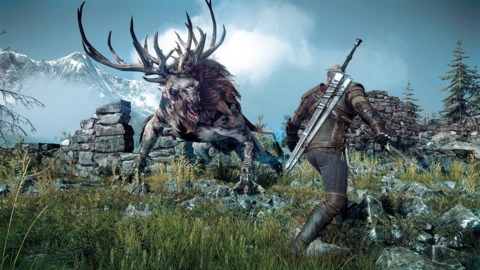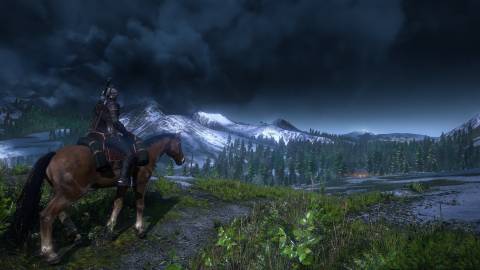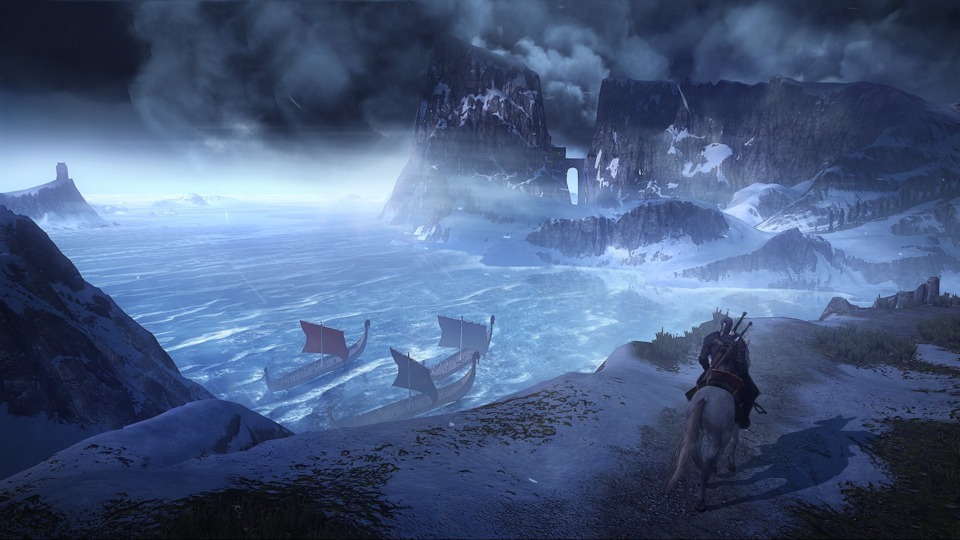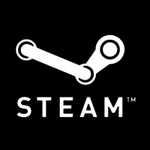DRM has become a dirty word. Don’t dare speak it, lest you uncork the Internet's wrath.

Digital rights management was invented for a single reason: control. It was conceived to combat piracy, but even with the best of intentions, it often punishes legitimate customers. And depending on who you talk to, piracy is either a huge problem or a reality of development creators should just embrace.
It’s not hard to imagine why a developer might be upset. These companies work for years on a game, and many, many people pour their heart, soul, and money into a project. Then, someone clicks on a torrent, and gains access to all of that by waiting for a download bar to fill up.
CD Projekt RED has tried it both ways. Both The Witcher and The Witcher 2 had DRM, though the latter ditched it. The former was due to an agreement with Atari. With The Witcher 2, we saw CD Projekt RED dragged into a very public fight about its beliefs on the matter. The version of The Witcher 2 with DRM was found to run substantially slower on people’s computers, and it was stripped out in a patch.
For a time, the developer was actually tracking people who downloaded the game through a torrent, and hit them with legal papers. This didn't go over well. In an interview with PC Gamer from late 2011, the developer estimated The Witcher 2 has been illegally downloaded more than 4.5 million times. That number can only have grown since. CD Projekt RED later dropped the practice of tracking pirates.
“We’ve heard your concerns, listened to your voices, and we’re responding to them,” said co-founder Marcin Iwinski in an open letter to fans in December 2012. “But you need to help us and do your part: don’t be indifferent to piracy. If you see a friend playing an illegal copy of a game--any game--tell your friend that they’re undermining the possible success of the developer who created the very game that they are enjoying. Unless you support the developers who make the games you play, unless you pay for those games, we won’t be able to produce new excellent titles for you.”
Iwinski is singing a slightly different tune about piracy these days. CD Projekt RED announced last week that The Witcher 3 would not feature any form of DRM--period. (Excluding Steam) One assumes that means it’s not going to be tracking pirates, either.
To learn a little more about how CD Projekt RED arrived at this decision, I sent some questions to Iwinski over email. Read on for our full conversation below. It’s a good one.
Giant Bomb: Can you talk about why CD Projekt RED chose to use DRM in the past? Ideally, what did you hope to achieve?
Marcin Iwinski: With The Witcher 1 it was not our choice, as it was a development deal and we had Atari as a publisher. That said, I should admit that at that time we just followed the ‘industry standard’ and did not consider DRM-free to be a cause worth dying for. We already had our opinion about it, but contractually we did not have a say. When the game was released we even held some hope that the DRM would help sales and wouldn’t be cracked for some time, but events proved us wrong: as with every DRMed game, it was cracked in no time.

It occurred to us that twisted logic governs this issue. We pay for a type of protection that requires users to go through a series of authenticating measures, then it fails to work, while the pirated version is actually more user-friendly, easier for gamers to deal with. As it turns out, we were quite naïve to agree to DRM in the first place, I have to say, but ultimately it is the mistakes we make that provide the most valuable lessons...
GB: Steam is a form of DRM, but consumers are okay with that. Why do you think that is?
Iwinski: It’s easy to use and it works--and those are usually the greatest weaknesses of any DRM system. It definitely makes a huge difference that Valve is a gamer-centric company--they really care about gamers, which is a rarity.Still, I believe more freedom should come with the content you buy. I would feel much safer if I could download all my games and play them off-line without running a client application first, without accessing the Internet. What if the servers go down? What if for some unforeseen legal reasons some content has to be removed from the cloud? Do I really own it, like I own discs I buy in the store, or not? These were actually among the main reasons why we started GOG.com.
GB: Was there ever a scenario where The Witcher 3 would have DRM? You know, much earlier in development?
Iwinski: We learned a lot from The Witcher 1 being DRMed and then The Witcher 2 being partly DRMed. For The Witcher 2 there was a DRM-free version on GOG.com on day one. Then, approximately two weeks after the launch, we released a patch that removed the DRM from the retail version, but still we had a co-publishing agreement and were contractually obliged to put a protection on the game, as per our publishing partner’s requirement. This was already a big step in the right direction compared to The Witcher 1, as we were able to release The Witcher 2 DRM-free digitally on GOG.com.
Now, you would expect the version available on pirate sites to be the GOG.com one--pretty much a no-brainer--as that version was not protected in any way whatsoever. Funny enough, pirates took the DRMed retail version and cracked it the day the game was released. It would be kind of hard to put the usual cracking group credits along the lines of “cracked by xxx” on a DRM-free version, wouldn’t it?
In the run-up to The Witcher 3, making it DRM-free was a key part of our plan from the beginning. We made sure to have this in the contract. Besides, people are beginning to see that going DRM-free does not cause any harm--in fact, it strengthens the bond with gamers. All the DRM-free releases on GOG.com proved this, so we did not actually face much resistance with TW3.
It seems to me that the industry as a whole knows DRM doesn’t work, but corporations still use it as a smokescreen, effectively covering their asses, pretending to protect their intellectual property in front of bosses, investors, and shareholders. I’ve actually had quite a few discussions with high level executives who admit they know DRM doesn’t work, but if they don’t use it somebody might accuse them of not protecting their property. Whenever policy trumps common sense, the best interest of gamers is lost in the process.

GB: DRM has become a dirty word. How do you think we’ve arrived at this point? Could it have gone differently?
Iwinski: Piracy has been there from the beginning. It started with the tapes containing games that friends would give to each other to copy (I still remember the protection systems modulating the recordings on magnetic tape, making them harder to copy for my first gaming machine--the ZX Spectrum), then floppy discs, CD-ROMs, DVD-ROMs and now we have the digital age. Could it have gone differently? I don’t think so, but we can change it now, so why not do it? When it’s easy to copy something and have it for free, a lot of people are tempted, and many ultimately go for it. Are they all stealing? Are they all thieves? Why do they do it? Was the game legally and easily available in their country? What was the price in relation to their average income? Did they even launch the game they just pirated, or did they grab it because they could? These are all vital questions and nobody’s asking them.
As an industry, our role is to educate the consumer and, simultaneously, to create a myriad of easy, extremely user-friendly and legal ways to buy content. “User-friendly" That’s the key, and it means no restrictions, no obstacles whatsoever.
Digital distribution is definitely a game changer. We can reach out to gamers directly, make content available worldwide at a moment’s notice, put games on sale ad hoc and generally dismantle the barriers that have traditionally existed between gamers and content. It’s a good direction and we should stay the course, but all that is just the beginning.
People will continue to choose the easier way as long as obstacles such as time-consuming registration and invasive authentication measures remain in place. They also prefer piracy to clumsy and hard to navigate digital platforms and regional restrictions. They might think, “I’m from country X, so I’m not allowed to buy half of the games on platform Y. Why is that?” As a consumer, I don’t care what the reasons are--if I can’t buy them, I look for an alternative source. Piracy’s biggest advantage is that it’s easy--you just type the name of the game, click on the link and it’s yours. No restrictions, nothing--just you and the game. Let’s remove all the obstacles to buying a legal copy: make it just as easy as piracy, and I’m sure gamers will come on board. That’s what we aim for with GOG.com. And we’ve already managed to prove it works with The Witcher 2.

GB: The argument from consumers is that DRM hurts the paying players. How much of that drives this decision for Witcher 3?
Iwinski: This was a key motive behind our decision. We want legit gamers to feel they own the game and can play it when they want to, how they want to. Why on earth should pirates have a better user experience than gamers who paid their hard earned money for our game? I sincerely think it should be the other way around: gamers acquiring legal copies should get a significantly better experience and deal than do pirates. While we can’t stop piracy, we can work on offering premium deals to those who buy our game and that’s what we plan to do with TW3. I strongly believe in using the carrot not the stick, so yes, we’re working to create some impressive carrots.
GB: In order to be a modern PC game in a world where players don’t want DRM, does that mean simply accepting piracy as part of business?
Iwinski: We shouldn’t accept it--that’s not the way to go. We should be active in convincing gamers to get a legal version, but the industry is moving in exactly the opposite direction by using DRM. Like I said: the carrot, not the stick. I would encourage content creators to strive to understand pirates, welcome them with open arms, embrace their motives, and then show them the advantages of buying a legal version of their game simply by making it worth their while--be it through free updates, additional free content when you register on their site, leaderboards, being a part of a meaningful community and, last but not least, not using DRM. And why no DRM? Because it just doesn’t work, and frequently does the opposite of what it was intended to do--it doesn’t stop any pirates, and instead acts as an obstacle to gamers who acquire their content legally.
"Will it [Witcher 3] be more pirated than if we put DRM on it? I definitely don’t think so. With a DRM-free release, we’re hoping to build more trust between us and gamers."
GB: No DRM means The Witcher 3 will be pirated. So how does CD Projekt RED intend to stop that from getting out of control?
Iwinski: No DRM means that The Witcher 3 will be easier to install and use the way gamers want to use it, whenever they want to use it. They will be free to back it up and as the files will have no protection, gamers will have a sense of true ownership.
Will it be more pirated than if we put DRM on it? I definitely don’t think so. Practically every single game’s DRM is cracked on day 0 (or even before then), so that’s not really an argument for using it. With a DRM-free release, we’re hoping to build more trust between us and gamers. This already worked with GOG.com’s DRM-free release of The Witcher 2 and we would like to take it to the next level with a DRM-free worldwide release of The Witcher 3 that will not only apply to the GOG.com version, but to boxed copies of the game as well.
GB: As media goes increasingly more digital, content holders will want more control. How do you see that tension playing out in the next 10 years?
Iwinski: Try to impose too much control, create artificial obstacles to people buying, accessing and using your content, and people will always look for easier alternatives. We all know that DRM of any sort will eventually be cracked. Content creators and platform holders should focus on making it as easy and convenient as possible for gamers to buy and play their games. Pirating will make much less sense when it’s easier to buy a game legally than it is to pirate it. Unfortunately, far too often in our industry it’s the other way around.